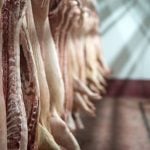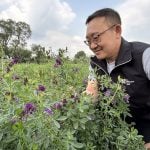Exotic alfalfa varieties that produce white, blue, cream and yellow flowers are being looked at by plant breeders to improve the crop's drought tolerance.


Yellow flowers could help scientists breed new varieties that cope with dry conditions

Research shows penny-pinching doesn’t pay off

Drought tolerance and productivity increases are targets of research programs


Business to be 'fully transitioned' after 2024 season


Research on the Record with Reynold Bergen

Alfalfa more profitable for domestic growers

Nature doesn’t always provide conveniently severe winters to select for survival

Research on the Record with Reynold Bergen